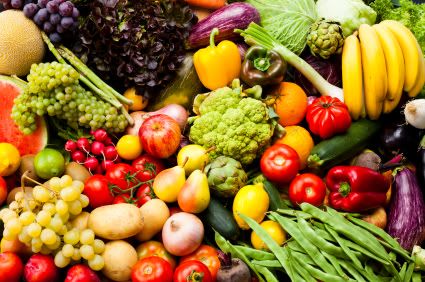At a playdate with a group of mothers, I once horrified an impossibly hip, young mom by telling her I refused to eat organic food because it was too expensive and that I felt I wouldn't be buying a better product. The look of shock on her face made me wonder if I had suddenly experienced a Janet Jackson-esque wardrobe malfunction. After glancing down to make sure I wasn't flashing anyone (and to check that Justin Timberlake wasn't lurking behind a bush), I tried to calmly explain my position on organic versus conventionally grown food.
As I nervously blathered on, I quickly realized I wasn't improving the situation (or making a lifelong friend). I wondered if she would burst into tears as she scolded me for feeding my children pesticides (as if I was pouring the stuff over my kid's cereal in the morning). Her breathing quickened as she told me that by buying non-organic milk, I was pumping my children full of recombinant bovine growth hormone (okay, she didn't actually say "recombinant bovine growth hormone;" she really said something closer to "cow stuff and stuff" but I understood her point). Her voice was shaking as she told me that I was complicit in torturing animals for failing to buy cage-free eggs. When I informed her that organic food was no more nutritious than conventionally grown food and that organic farmers actually do use pesticides, the veins in her neck began to show.
But when I told her that I love the convenience of having shelf-stable (read: irradiated) milk and cream on hand and that I thought genetically modified food was perfectly safe and represented an exciting development in the agriculture industry, the woman began to gather her things and announced she was leaving the playdate. The party was over.
It was an awkward moment but I couldn't help but stir the pot a little.
Jayson Lusk–a food writer and agriculture economics professor at Oklahoma State University (and the author of a soon-to-be-released book on the food police) is sure to similarly stir the pot over on the Huffington Post. His provocatively titled piece "Why You Shouldn't Buy Organic" is sure to generate some colorful remarks in the comments section. He says:
Everywhere you turn, you hear "organic is healthier", "organic is greener", or "you absolutely MUST buy organic." It's not a question of whether we want to eat healthy, environmentally friendly food — who doesn't want that? The question is whether organic lives up to the hype and whether it's worth it to pay a hefty premium. One of the problems with organic is that few shoppers know what the term really means, and they project onto the nebulous word all their hopes and dreams of good eating. Despite what many believe, organic doesn't mean food from small farms, produced without pesticides, or grown in the USA. There are a few advantages to eating organic but there are some drawbacks too. If you're rich enough and well-informed on the issues, then I say go for it. But, if you're not so sure whether organic lives up to all it is promised to be, here are a few reasons to re-think doubling your grocery bill.
I'm sure Lusk would agree that people should be free to buy whatever they want but consumers should also be given accurate information so that they can make informed decisions. Too often today, people are led to believe they must spend more to eat good and healthy food.
Similar hostility is often directed at convenience foods like canned, frozen and processed food. So often, food snobs turn their nose up at the convenience of these products but these snobs should try to understand the demands of modern life. To the food snobs, food is the number one consideration. It simply doesn’t occur to them that people have other interests and other demands on their time. Food snobs simply can’t wrap their head around the concept that for some, food takes a back seat to a long list of other priorities. It may shock the food snobs to learn that some people simply don’t like to cook. They get no joy out of it; they view it as a chore. For these folks, convenience is a must and relying on these conveniences doesn’t necessarily equal unhealthy food.
There are plenty of healthy canned and frozen foods out there and we should be encouraging the use of them if it increases the likelihood that parents will do more cooking for their kids and if it will help parents sit down with their kids to have family meals—which studies show is critical in keeping kids at a healthy weight.
People use a variety of excuses for not preparing food at home. They say it’s too hard, it's time consuming or it's expensive to make a meal from scratch. They also likely feel overwhelmed by the narrative that you must buy organic; you must never feed your kids processed food; everything must be made from scratch using the highest quality ingredients. Who wouldn't be discouraged by such strict rules?
What I would like to see is some reasonableness, some empathy for busy parents who might need to take a short cut now and then. Reassuring parents that eating less expensive, conventionally grown food is one way to encourage more home cooking. Food writers (and celebrity psudo-cooks) might consider easing up a little on the guilt so often directed to parents who might occasionally need to throw a frozen pizza in the oven on a busy night or commit the mortal sin of stopping by a fast food restaurant (gasp!).
Lusk is an important voice of reason. He should be praised for challenging the cult of organics. His piece will go far to reassure parents that they don't need to spend a fortune to provide their kids a healthy meal. Of course, it will probably make a few people mad…especially a certain impossibly hip, young mom.


